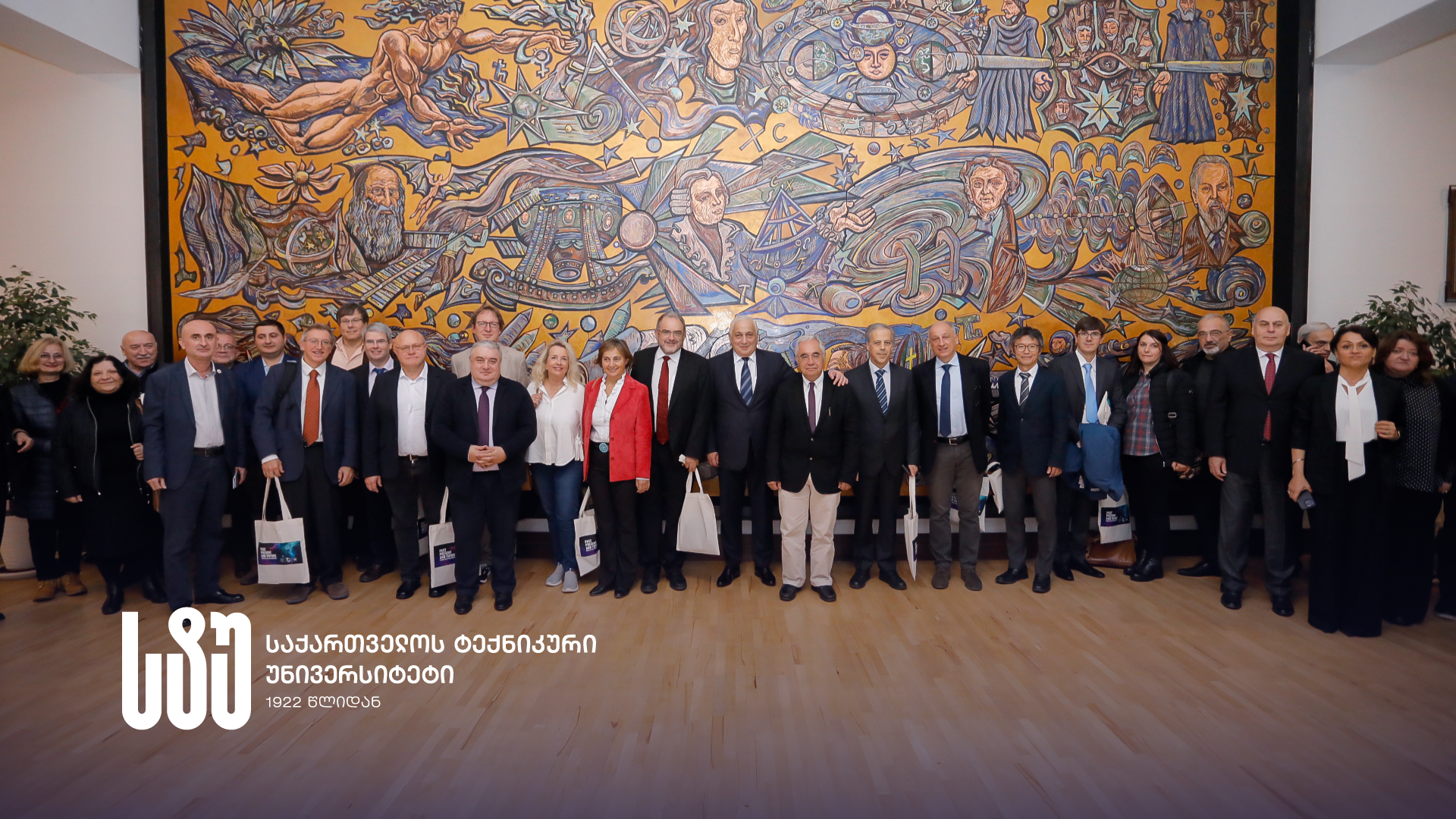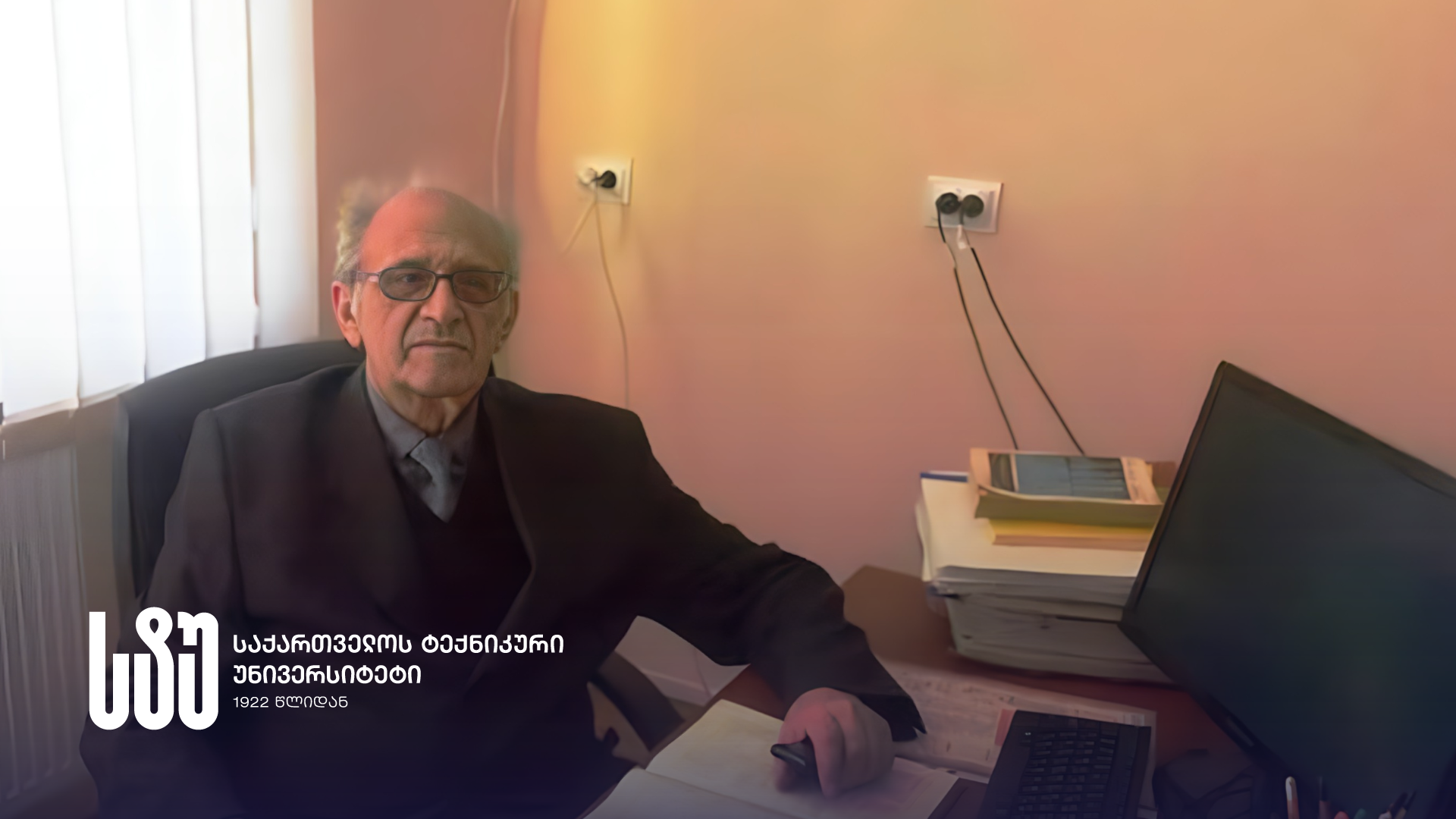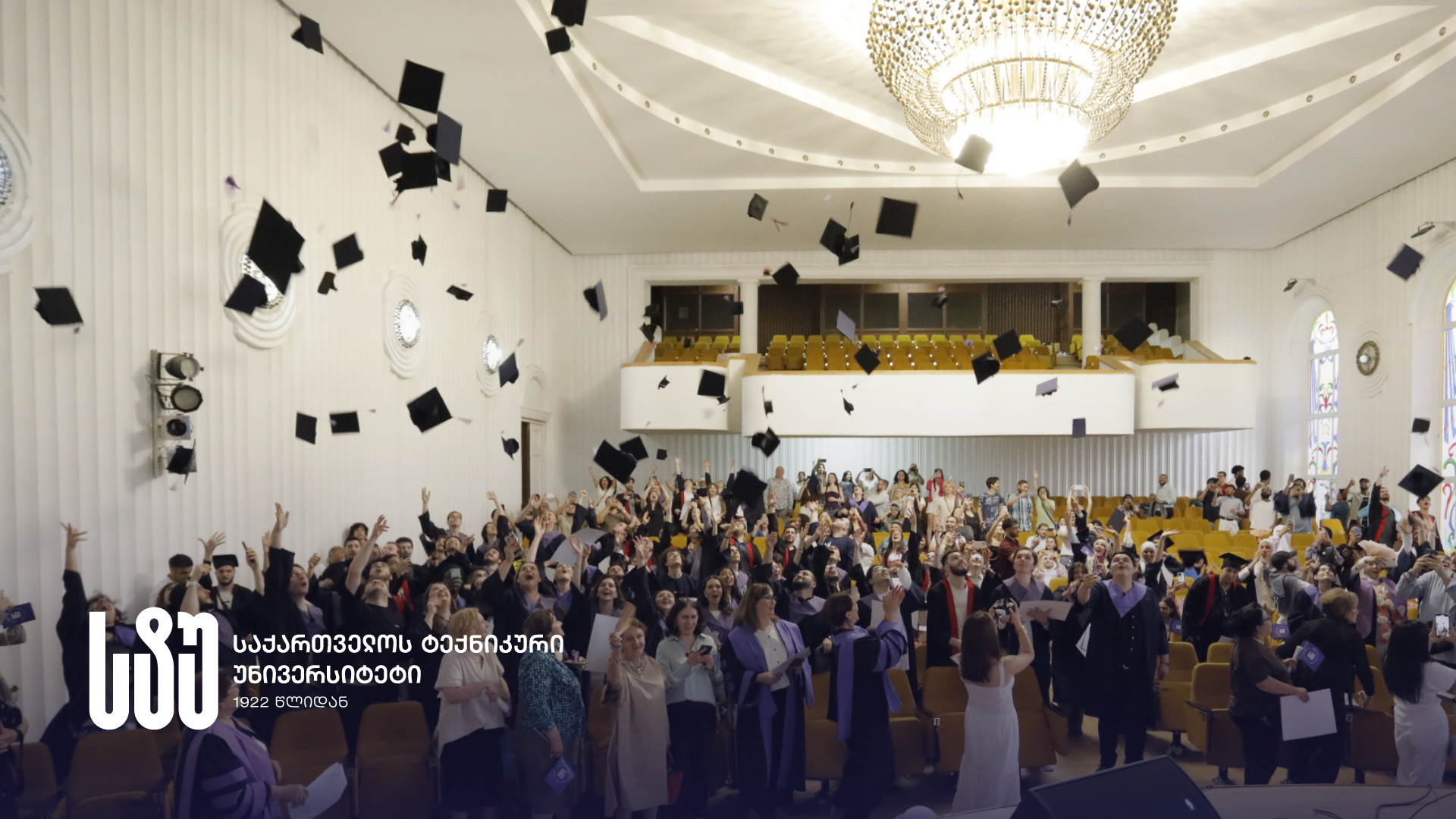The GTU Rector Met with the President of the CERN Council and the Delegation Within the Framework of the 70th Anniversary of the European Organization for Nuclear Research
17-10-2024
The rector of the Georgian Technical University, Academician David Gurgenidze, met the President of the CERN Council, Professor Costas Fontas and a CERN representative scientist delegation within the framework of events dedicated to the 70th anniversary of one of the largest scientific centers in the world - the European Organization for Nuclear Research (CERN).
Georgia and the Georgian Technical University are among the member countries and member universities of the CERN/CMC collaboration, which within the anniversary framework, the delegation of the European Organization for Nuclear Research is visiting on a business visit.

The rector, academician David Gurgenidze and the head of the CERN delegation, the newly elected president of the Council of the European Organization for Nuclear Research, professor Kostas Fontas, held the first extended meeting today, in which famous CERN scientists participated - CMS Collaboration Deputy Resource Manager Andrzej Kharkiewicz, CMS/HGCal Coordinator David Barney, CMS/RPC Sub-Detector Head Salvatore Buontempo, CERN 70th Anniversary Events Coordinator, Luciano Musa – the head of Non-Member States Committee, CMS Leader Tiziano Camporesi, CMS Lead Scientist - Chiara Mariotti, CMS Resource Coordinator - Kirsty Aspola, Rector of Ivane Javakhishvili Tbilisi State University - Academician Jaba Samushia, Japanese scientist on a working visit to GTU, manager of one of the world’s largest COMET experiments in Japan proton accelerator research complex J-PARC under the auspices of Japan High Energy Accelerator Research Organization (KEK), Advisor to the Japanese Ministry of Education, Science, Culture and Sports - Satoshi Mihara.
The meeting, which was opened by the rector David Gurgenidze, was attended by the GTU administration representatives, the director of the Institute of Quantum Physics and Engineering Technologies of the GTU, the official representative of Georgia at CERN, as well as the leader of the university group of scientists at CERN - Zviad Tsamalaidze, the university scientific-academic Circles, students and invited Georgian scientists.
David Gurgenidze congratulated the President of the CERN Council and the scientists on the anniversary. He focused on the possibilities of expanding the cooperation between the Georgian Technical University and the European Organization for Nuclear Research, which is related to the renewal of phase 2 of the CMS experiment at the Large Hadron Collider (LHC) and the Future Circular Collider (FCC) and the future participation of the group of scientists of GTU in the realization works.
According to the rector, the Georgian Technical University is a member of the CMS collaboration of the European Organization for Nuclear Research. As he mentioned, the physicists, engineers, and IT specialists of the University Institute of Quantum Physics and Engineering Technologies are actively participating in the CERN/CMS experiment, which is greatly supported and organized by the Ministry of Education, Science, and Youth of Georgia.
“I am happy, because I am an eyewitness of the great scientific work that is going on at CERN, and the scientists and engineers of our university participate in this important work.
Over the years, collaboration with one of the largest research centers in the world has brought many beneficial results for the Georgian Technical University.
The fact that the coat of arms of the Georgian Technical University is placed on the CMS maps together with the coats of arms of the world’s leading universities and organizations confirms the success of the physicists and engineers of our university. A group of scientists from the Institute of Quantum Physics and Engineering Technologies of our university - led by Professor Zviad Tsamalaidze and composed of Yuri Baghaturia, Davit Lomidze, Otar Kemularia, Irakli Lomidze, Sandro Melkadze - performs the most difficult tasks in the CMS experiment at the Large Hadron Collider.
I would like to thank the European Organization for Nuclear Research for the confidence they expressed to the Georgian Technical University and the high assessment of the contribution of Georgian scientists.
I must mention that the efforts of the Government of Georgia, Prime Minister Irakli Kobakhidze, the Ministry of Education, Science, and Youth, and their support to Georgian universities in the direction of integration into the international educational and scientific space are invaluable.
Recently, we signed two new memorandums of understanding with CERN, which will be very important for the development of our Georgian science and the progress of the country. This means that the scientists of the Georgian Technical University will participate in the renewal of phase 2 of the CMS experiment and, what is extremely important, in the FCC of the Future Cyclic Collider realization at CERN. The implementation of the 100-kilometer cyclic FCC collider program will begin immediately after the completion of the Large Hadron Collider program.
During these few days, together with the President of the CERN Council, Professor Kostas Fontas, who is visiting Georgia for the first time, and famous scientists, we will discuss important issues related to current and future collaborations. It is extremely important for us how fruitful the process of scientific collaboration with CERN will be in the future.
It significantly increases the international recognition of the Georgian Technical University and its scientists, young researchers, because successfully implemented international projects, moreover, participation in global scientific experiments increases the possibilities of successful integration of the Georgian Technical University in the international scientific space”, announced the rector of the Georgian Technical University, David Gurgenidze.
The gathered public was welcomed by the Rector of TSU - Academician Jaba Samusia, President of the CERN Council - Professor Kostas Fontas, famous CERN scientists - Professors: Salvatore Buentempo, Luciano Musa, Tiziano Camporesi, and COMET experiment manager - Professor Satoshi Mihara.
CERN scientists thanked the rector and researchers of the Georgian Technical University for their significant contribution to the CERN/CMS collaboration and experiment.
As they mentioned, the group of GTU scientists has been working effectively on such sub-detectors of the CMS experiment as the muon spectrometer (RPC) detectors and the hadronic calorimeter (HCAL) for many years, and are actively involved in the key tasks in the sub-detectors. In addition, they are involved in both the optimization and analysis of the CMSSW platform core software, as well as the geometry analysis of the CMS experiment GEANT4, in addition are working on the creation of the Technical Design Report - TDR for the FCC program.
The working visit of the CERN delegation to the Georgian Technical University will continue until October 20th. During the visit, CERN scientists will meet university scientists, engineers, and young researchers. At the meetings, the completed works and the plans for the near future will be discussed thoroughly.
Georgia and the Georgian Technical University are among the member countries and member universities of the CERN/CMC collaboration, which within the anniversary framework, the delegation of the European Organization for Nuclear Research is visiting on a business visit.

The rector, academician David Gurgenidze and the head of the CERN delegation, the newly elected president of the Council of the European Organization for Nuclear Research, professor Kostas Fontas, held the first extended meeting today, in which famous CERN scientists participated - CMS Collaboration Deputy Resource Manager Andrzej Kharkiewicz, CMS/HGCal Coordinator David Barney, CMS/RPC Sub-Detector Head Salvatore Buontempo, CERN 70th Anniversary Events Coordinator, Luciano Musa – the head of Non-Member States Committee, CMS Leader Tiziano Camporesi, CMS Lead Scientist - Chiara Mariotti, CMS Resource Coordinator - Kirsty Aspola, Rector of Ivane Javakhishvili Tbilisi State University - Academician Jaba Samushia, Japanese scientist on a working visit to GTU, manager of one of the world’s largest COMET experiments in Japan proton accelerator research complex J-PARC under the auspices of Japan High Energy Accelerator Research Organization (KEK), Advisor to the Japanese Ministry of Education, Science, Culture and Sports - Satoshi Mihara.
The meeting, which was opened by the rector David Gurgenidze, was attended by the GTU administration representatives, the director of the Institute of Quantum Physics and Engineering Technologies of the GTU, the official representative of Georgia at CERN, as well as the leader of the university group of scientists at CERN - Zviad Tsamalaidze, the university scientific-academic Circles, students and invited Georgian scientists.
David Gurgenidze congratulated the President of the CERN Council and the scientists on the anniversary. He focused on the possibilities of expanding the cooperation between the Georgian Technical University and the European Organization for Nuclear Research, which is related to the renewal of phase 2 of the CMS experiment at the Large Hadron Collider (LHC) and the Future Circular Collider (FCC) and the future participation of the group of scientists of GTU in the realization works.
According to the rector, the Georgian Technical University is a member of the CMS collaboration of the European Organization for Nuclear Research. As he mentioned, the physicists, engineers, and IT specialists of the University Institute of Quantum Physics and Engineering Technologies are actively participating in the CERN/CMS experiment, which is greatly supported and organized by the Ministry of Education, Science, and Youth of Georgia.
“I am happy, because I am an eyewitness of the great scientific work that is going on at CERN, and the scientists and engineers of our university participate in this important work.
Over the years, collaboration with one of the largest research centers in the world has brought many beneficial results for the Georgian Technical University.
The fact that the coat of arms of the Georgian Technical University is placed on the CMS maps together with the coats of arms of the world’s leading universities and organizations confirms the success of the physicists and engineers of our university. A group of scientists from the Institute of Quantum Physics and Engineering Technologies of our university - led by Professor Zviad Tsamalaidze and composed of Yuri Baghaturia, Davit Lomidze, Otar Kemularia, Irakli Lomidze, Sandro Melkadze - performs the most difficult tasks in the CMS experiment at the Large Hadron Collider.
I would like to thank the European Organization for Nuclear Research for the confidence they expressed to the Georgian Technical University and the high assessment of the contribution of Georgian scientists.
I must mention that the efforts of the Government of Georgia, Prime Minister Irakli Kobakhidze, the Ministry of Education, Science, and Youth, and their support to Georgian universities in the direction of integration into the international educational and scientific space are invaluable.
Recently, we signed two new memorandums of understanding with CERN, which will be very important for the development of our Georgian science and the progress of the country. This means that the scientists of the Georgian Technical University will participate in the renewal of phase 2 of the CMS experiment and, what is extremely important, in the FCC of the Future Cyclic Collider realization at CERN. The implementation of the 100-kilometer cyclic FCC collider program will begin immediately after the completion of the Large Hadron Collider program.
During these few days, together with the President of the CERN Council, Professor Kostas Fontas, who is visiting Georgia for the first time, and famous scientists, we will discuss important issues related to current and future collaborations. It is extremely important for us how fruitful the process of scientific collaboration with CERN will be in the future.
It significantly increases the international recognition of the Georgian Technical University and its scientists, young researchers, because successfully implemented international projects, moreover, participation in global scientific experiments increases the possibilities of successful integration of the Georgian Technical University in the international scientific space”, announced the rector of the Georgian Technical University, David Gurgenidze.
The gathered public was welcomed by the Rector of TSU - Academician Jaba Samusia, President of the CERN Council - Professor Kostas Fontas, famous CERN scientists - Professors: Salvatore Buentempo, Luciano Musa, Tiziano Camporesi, and COMET experiment manager - Professor Satoshi Mihara.
CERN scientists thanked the rector and researchers of the Georgian Technical University for their significant contribution to the CERN/CMS collaboration and experiment.
As they mentioned, the group of GTU scientists has been working effectively on such sub-detectors of the CMS experiment as the muon spectrometer (RPC) detectors and the hadronic calorimeter (HCAL) for many years, and are actively involved in the key tasks in the sub-detectors. In addition, they are involved in both the optimization and analysis of the CMSSW platform core software, as well as the geometry analysis of the CMS experiment GEANT4, in addition are working on the creation of the Technical Design Report - TDR for the FCC program.
The working visit of the CERN delegation to the Georgian Technical University will continue until October 20th. During the visit, CERN scientists will meet university scientists, engineers, and young researchers. At the meetings, the completed works and the plans for the near future will be discussed thoroughly.


